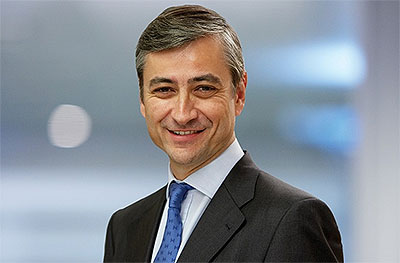
Jean-Philippe Courtois, Microsoft International President.
The visit comes at a time when Vietnam is set to benefit significantly from the Trans-Pacific Partnership deal (TPP) and the need for digital transformation is more urgent than ever to help organisations continue to thrive. As a trusted cloud advisor and with over two decades of impact in the Vietnamese market, Microsoft has become a prominent enterprise that is active in supporting the government, local authorities and enterprises, to develop the IT capabilities of the country.
Empowered by its mission to help everyone on the planet to achieve more, by empowering them with tools and services, Microsoft is reinventing productivity and business processes, building the intelligent cloud platform and creating more personal computing.
At a business roundtable today, Jean-Philippe Courtois reaffirmed Microsoft’s commitment to Vietnam’s ICT 2020 Vision Policy - a government initiative to use technology to drive competiveness and national economic growth. “As an emerging economic hotspot, Vietnam has huge potential to register the highest growth rate in the cloud sector across Southeast Asia,” said Courtois at the roundtable.
“With highly-skilled and competitive software developers in place, a young technically-savvy population, the commitment of big foreign investment projects, and factors like the pervasive mobile network and significant investment in the ICT infrastructure, the country is on the cusp of a major IT sector transformation,” Courtois added.
Cybersecurity has emerged as one of the key concern areas for government bodies, organisations and enterprises in Vietnam in recent years. This was especially notable last year, which saw numerous attacks on Vietnamese websites and organisations experiencing data loss due to malware infections.
Today, cybersecurity is considered as one of Vietnam’s most critical national security priorities. “Cybercriminals are breaking away from their traditional vectors of attack, developing new tools and techniques as well as shifting their targets – focusing less on theft of financial information and more on business espionage and accessing sensitive information,” said Vu Minh Tri, country manager, Microsoft Vietnam. “Given this scenario, we are excited to support Vietnamese businesses in addressing these large-scale issues that are important to the IT industry development in Vietnam, as well as with the larger aim of keeping the internet safer for every citizen.”
Some of the other topics discussed during the roundtable included how Microsoft is working to reinvent productivity to help businesses transform. New productivity platforms such as Office 365 and Windows 10 are enabling more secure mobile working scenarios, enabling businesses to work from anywhere.
For organisations, Microsoft Azure and new hybrid-cloud scenarios enabled by StorSimple can help improve how businesses provide applications and store and backup information much more cost effectively than typical systems used today.
“Over the last decade, globalisation and technology innovations have brought the world closer, and fundamentally changed the way people live and work. We want to reinvent productivity for Vietnam’s workforce, so they are more confident and enabled for the TPP integration. Microsoft’s products and services will help them be more creative and collaborative in a new and advanced way,” added Tri. Tri also stressed that Microsoft would cooperate with the Vietnamese government and local partners to assist in the development of IT human resources for the country, including working knowledge of infrastructure, security and software app development.
Courtois highlighted the need for countries moving to the cloud to know that their data and services are in reliable hands, and are secure, based on independent standards bodies such as ISO, and clear policies in cybersecurity, data privacy, compliance and transparency.
This was evidenced by recent announcements made by Microsoft CEO Satya Nadella, which included a new Cyber Defense Operations Centre, a new Microsoft Enterprise Cybersecurity Group, and new Enterprise Mobility Suite (EMS) support for mobile application management without the need to enroll the device. Nadella also stressed the importance for a new approach to security in this mobile-first, cloud-first world, sharing how Microsoft uses its unique insight into the threat landscape to help better protect customers.
He also showcased how Microsoft technologies work in tandem with each other, and with solutions from the security ecosystem, to deliver a holistic, agile, security platform for today’s enterprises; as well as how various Microsoft technologies protect customers from identity attacks, accidental or intentional loss of corporate data and the installation of malware. “Microsoft’s approach to security, our unique differentiators and how new and existing Microsoft technologies, and those of our partners, work together to help protect customers from attack,” Courtois said.
“People use technology that they trust. Microsoft is deeply invested in Vietnam. We will continue to partner with the government and industry stakeholders to help transform Vietnam’s economy, drive innovation and empower Vietnamese people to achieve more,” he noted.
